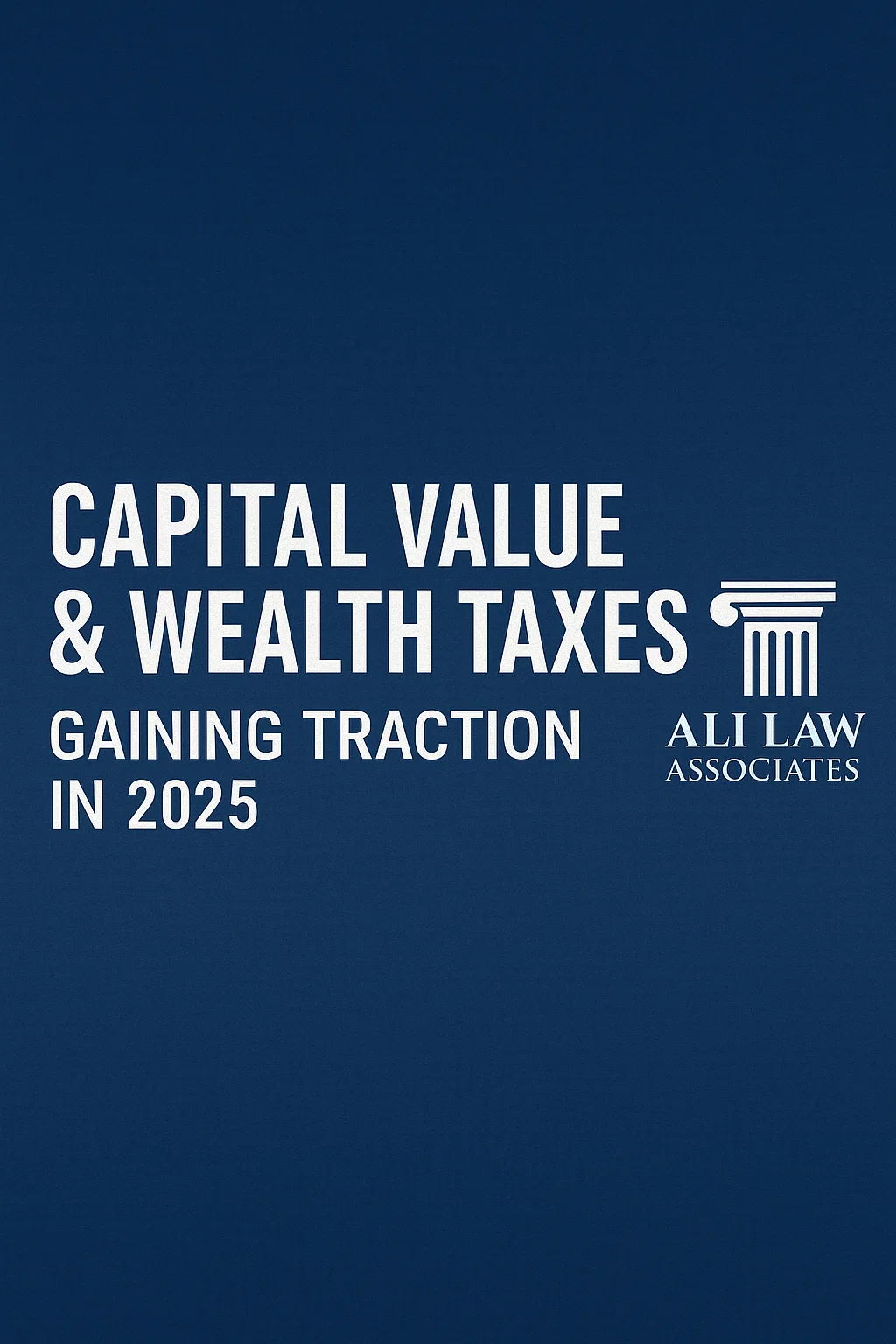What property owners, investors, and high-net-worth individuals must know now.
Introduction
Capital Value & Wealth Taxes; The taxation landscape in Pakistan is evolving rapidly in 2025. From the introduction of Capital Value Tax (CVT) on immovable properties to the rising discussions around Wealth Tax on high-value assets, taxpayers need to stay vigilant. These reforms aim to create a more transparent system, broaden the tax base, and ensure equity in revenue collection.
For property owners and investors, this shift means rethinking asset management strategies and ensuring compliance to avoid penalties. At Ali Law Associates, we help individuals and businesses navigate these complex taxation changes with expert legal and financial advice.
📌 What is Capital Value Tax (CVT)?
Capital Value Tax (CVT) is a tax imposed on the capital value of assets rather than the rental or transactional value. In simpler terms, instead of being taxed based on income generated, properties are taxed based on their fair market value.
✅ Key Features of CVT in 2025:
- Applied on purchase, transfer, or ownership of immovable property.
- Punjab has already shifted towards a Capital Value-based regime for property taxation.
- Properties in urban areas face higher valuation compared to rural locations.
- The Federal Board of Revenue (FBR) regularly updates valuation tables. Read official FBR updates.
📖 Internal Resource: Learn more about our Tax Advisory Services at Ali Law Associates.
📌 Wealth Taxes – The Return of an Old Concept
Wealth Tax refers to taxation imposed on an individual’s net wealth, including both movable and immovable assets such as luxury properties, vehicles, jewelry, and financial investments.
✅ Current Developments in Pakistan:
- Policymakers are discussing the revival of wealth tax to target high-net-worth individuals.
- The move is aligned with IMF and global recommendations for a fairer tax system.
- Assets above a defined threshold may become taxable under a new framework.
🌍 External Insight: See how OECD countries handle wealth taxes globally.
📖 Internal Resource: For personalized consultation, visit our Legal Tax Planning page.
📌 Why These Taxes are Gaining Traction
- Revenue Generation: Pakistan faces a significant fiscal deficit, making new revenue streams essential.
- Equity & Fairness: High-value property owners contribute less compared to salaried taxpayers.
- Global Pressure: IMF and international institutions encourage progressive taxation.
- Urbanization: With rising property prices, a rental-based system is outdated and unfair.
📌 Impact on Property Owners & Investors
For property owners, especially in metropolitan areas like Lahore, Karachi, and Islamabad, the new taxation system has both challenges and opportunities.
🔹 Challenges:
- Higher tax liabilities for luxury properties.
- Increased documentation requirements.
- Risk of penalties for underreporting values.
🔹 Opportunities:
- Transparency in property valuation.
- Possibility of exemptions for smaller or agricultural properties.
- Fairer tax contribution compared to income-based taxation.
📖 Internal Resource: Explore our Real Estate Legal Services for detailed guidance.
📌 Key Exemptions & Reliefs
Certain exemptions help balance the burden:
- Small properties below specific thresholds.
- Agricultural land in rural areas.
- Inherited properties with limited income potential.
However, these exemptions are evolving. Always verify the latest criteria with Ali Law Associates or directly from FBR notifications.
📌 Compliance Tips for 2025
To stay ahead in this changing taxation regime:
- Review Asset Portfolio: Ensure accurate valuation of all immovable properties.
- Document Ownership: Maintain legal documentation for all assets.
- Consult Experts: Professional advice can prevent costly mistakes.
- Stay Updated: Tax rules are evolving quickly in 2025.
📌 How Ali Law Associates Can Help
At Ali Law Associates, we specialize in:
- 📝 Tax Advisory & Planning – Structuring your assets for minimal liability.
- ⚖️ Legal Representation – Handling disputes and appeals with FBR.
- 🏢 Corporate Taxation Services – Ensuring compliance for businesses.
- 🏠 Property Tax Guidance – Navigating CVT and local tax regulations.
📖 Internal Resource: See our Services Page for a full breakdown.
📌 Global Perspective – Learning from Other Countries
- India: Introduced similar capital value-based property tax systems in major cities.
- France: Once had a wealth tax, replaced by real estate wealth tax.
- Norway & Spain: Still impose annual wealth taxes on high-value individuals.
🌍 For more, see PwC Global Tax Summaries.
📌 FAQs on CVT & Wealth Taxes in 2025
Q1: Is Capital Value Tax applicable on inherited property?
➡️ Usually exempt, but always check latest FBR guidelines.
Q2: Who will be most affected by Wealth Tax?
➡️ High-net-worth individuals with luxury properties, cars, and investments.
Q3: How often are property valuation tables updated?
➡️ FBR updates them periodically, often annually.
📌 Conclusion
The shift towards Capital Value Taxation and the potential revival of Wealth Taxes represent a significant transformation in Pakistan’s taxation framework. For property owners, investors, and corporations, compliance and proactive planning are no longer optional—they are essential.
At Ali Law Associates, our goal is to provide clients with clear, reliable, and strategic tax solutions. By staying ahead of regulatory changes, we ensure that you remain compliant while minimizing your tax burden.
📞 Contact us today to schedule a consultation and secure your financial future under the new tax regime.


